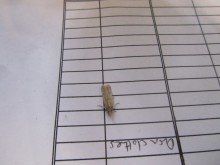A rare seaside moth has been discovered on Brownsea Island nature reserve for the first time. Moth trapping by Dorset Wildlife Trust wardens on the island has already revealed over 700 species but the latest find was a particular surprise – Gymnancyla canella – found only in sandy coastal areas.
The discovery follows the return of prickly saltwort, a rare plant of sandy beaches and dunes that provides food for the moth’s larvae. Thought to be extinct in Dorset until it was rediscovered at Shell Bay, this plant now grows on the Sandbanks peninsula and in Studland Bay as well as on the beaches of Brownsea Island. It grows on sandy seashores, reaching between10 and 50cm and its flower and leaf are both an olive green colour. The flowering period between July and September is the same as the moth’s flight season, probably because the moth helps to pollinate the plant.
Abigail Gibbs, Dorset Wildlife Trust reserve warden on the National Trust owned island, said: “It is wonderful to discover a new moth for Brownsea, but especially exciting that it has been able to come here because of the success of a rare seaside plant. Finding this moth highlights the importance of coastal areas, and how conserving these precious landscapes helps a whole range of wildlife as well as helping to protect our coast. We have found three individuals here this summer so we will be looking for larval cocoons to find out whether they are breeding here.”
Gymnancyla canella is mainly found in the South and South Eastern part of the UK. Its forewing colour ranges from sandy white to pale brick red, through to shades of pale grey and salmon pink, and its wingspan is just 23mm. When young, the larvae feed internally in the stems or shoots of the plant, but later feed externally from a silken web containing trapped grains of sand. In earlier days prickly saltwort was used for making soap and glass, which explains its other name, prickly glasswort.
Dorset Wildlife Trust is looking for volunteers to help monitor the plants and other wildlife of the seashore. For more information, visit dorsetwildlifetrust.org.uk/wellyzone or ring 01929 481044.







